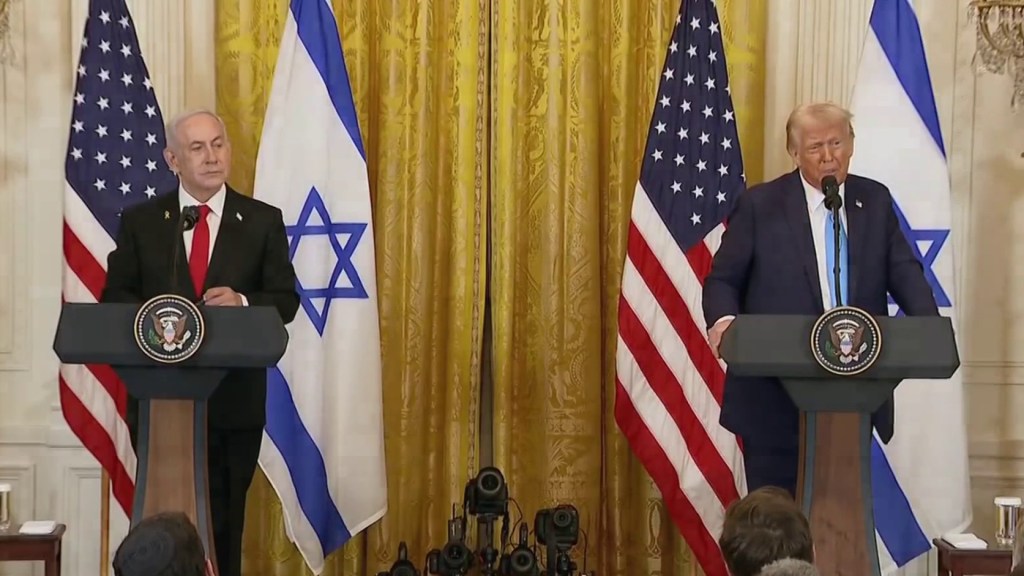Trump’s Gaza Emigration Proposal Sparks Debate Amidst Ongoing Conflict
Former President Donald Trump’s recent comments regarding the emigration of Palestinians from Gaza have ignited fierce debates, reflecting profound divisions both within the enclave and across the Arab world. While Trump’s vision of transforming Gaza into “the Riviera of the Middle East” suggests an optimistic future, the complexities of the ongoing conflict and humanitarian crisis complicate his proposal.
The Proposal and Its Reception
During a White House event with Israeli Prime Minister Benjamin Netanyahu, Trump suggested that Palestinians should leave Gaza to rebuild their lives following months of devastating warfare. The reactions to these remarks were swift and varied, ranging from strong condemnation by Palestinian leaders to mixed responses from the residents of Gaza themselves.
“Trump’s call for relocation sounds appealing to some, but the reality on the ground is far more complex,” said Joseph Braude, president of the Center for Peace Communications, in a conversation with Fox News Digital. While some youths express a desire to emigrate for a chance at a better life, others strongly oppose the idea of leaving their homeland.
One young man from Gaza expressed his desperation, saying, “I want Trump to relocate us as he suggested. I will be the first to go. There is no life left here. Just look around—life here is gone.” His sentiments illustrate the hardship many face as they contend with dire living conditions.
Challenges in Gaza and Calls for Migration
With the conflict exacerbating the humanitarian crisis, calls for migration have surged. “To our brothers in Egypt and Jordan, and to King Abdullah—we hope you open the crossing for the youth who want to leave, for the wounded, the sick, and the elderly who need treatment,” a Gazan pleaded, pleading for help in securing an escape route.
Jordan’s King Abdullah is set to meet with Trump this week to discuss the overwhelming situation in Gaza. The king has publicly denounced any plans that involve annexing the territory or forcibly relocating its residents, arguing that such actions would undermine long-term peace prospects.
A pre-war poll conducted by the Palestinian Center for Policy and Survey Research indicated that 31% of Gazans were already contemplating emigration, with that number jumping to 44% among young people. Preferred destinations included Turkey, Germany, Canada, the United States, and Qatar, illustrating a desire to find safety and stability amidst ongoing turmoil.
An Increasing Desire to Leave
The devastating effects of the war have only intensified these sentiments. As Joseph Braude stated, “We have seen the number of Gazans seeking to leave grow significantly as devastation continues. People are desperate.” The absence of hope for a brighter future in Gaza underscores the urgency of these migration discussions.
Palestinian journalist Ayman Khaled underscored the lingering challenges of rebuilding Gaza, warning, “The reconstruction process will take years. Where will the youth go in the meantime? More than 100,000 people are injured. Before this war even started, many were leaving—students, business owners, workers. Now, those numbers will surge.”
Khaled’s comments resonate with the overwhelming sentiment of hopelessness in Gaza. As long as Hamas maintains its hold on power, cycles of conflict are likely to persist, prompting further migration in search of safety. “If Hamas remains, this will keep happening. We can’t discuss anything else as long as they are in control,” he lamented.
Resistance to Emigration and Diverse Voices
Despite the stark realities facing Gazans, there is notable resistance against the idea of emigration. Hamas quickly dismissed Trump’s suggestion as a “recipe for chaos and tension in the region.” Many Gazans, regardless of the hardships they face, refuse to even contemplate leaving their homeland.
Mustafa al-Gazzar, a displaced Gazan, articulated the defiance felt by many: “You think you’ll expel me and replace me with others? I would rather live in a tent under the rubble. I won’t leave.” This sentiment was echoed by others, like seventy-one-year-old Amna Omar, who stated, “Gaza is our land, our home. I don’t want to die in Egypt.”
Another woman from Deir al-Balah emphasized their connection to the land: “We clung to our destroyed homes, and we will cling to the soil of Palestine.” Such sentiments reveal a deep-rooted attachment to their homeland, illustrating the emotional complexities intertwined with the notion of migration.
A Divisive Political Issue
While the idea of voluntary emigration has been discussed for years, Trump’s endorsement has rekindled controversial debates regarding Palestinian displacement. Arab governments remain cautious, wary of being perceived as complicit in the forced relocation of Palestinians. They have strongly condemned discussions around emigration as a political maneuver rather than a genuine solution to the crisis.
However, as Gaza lies in ruins with scant prospects for recovery, the urgency surrounding migration discussions persists. The debate is no longer solely about whether Gazans want to leave. Instead, it centers on whether they will have the opportunity to do so in seeking a better future.
Ultimately, a Gazan encapsulated this sentiment: “In the end, people will accept reality. They’ll emigrate because they want to live. They want a country that protects and supports them, where they can hold their heads high. If our own country does not look out for us, where else can we go?”
